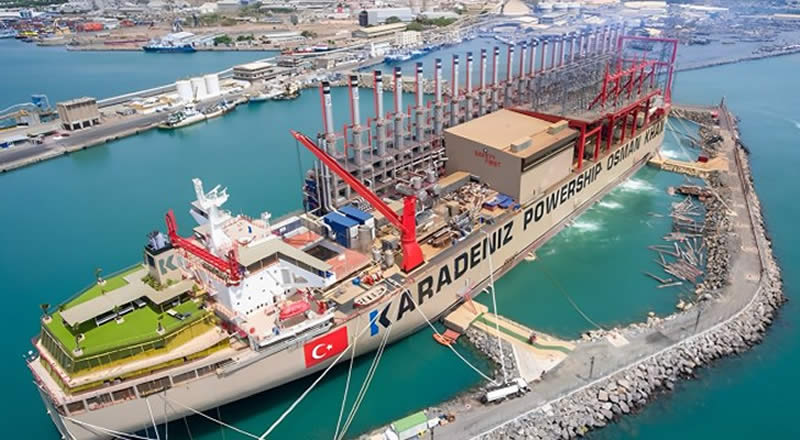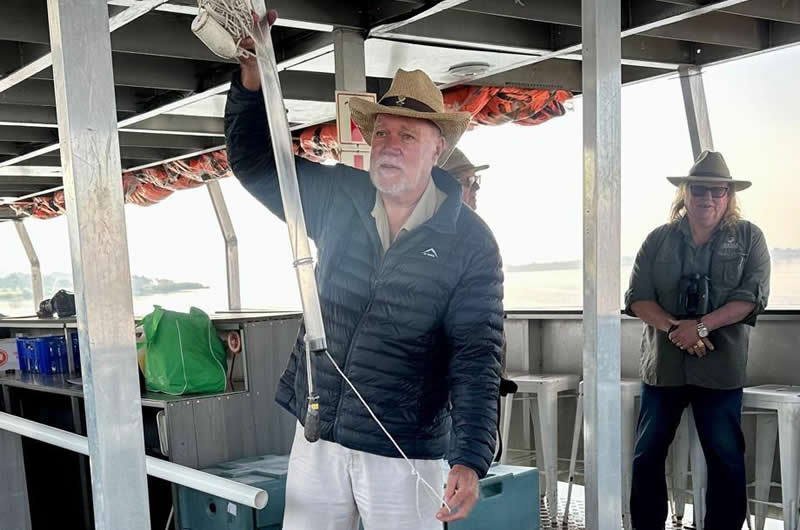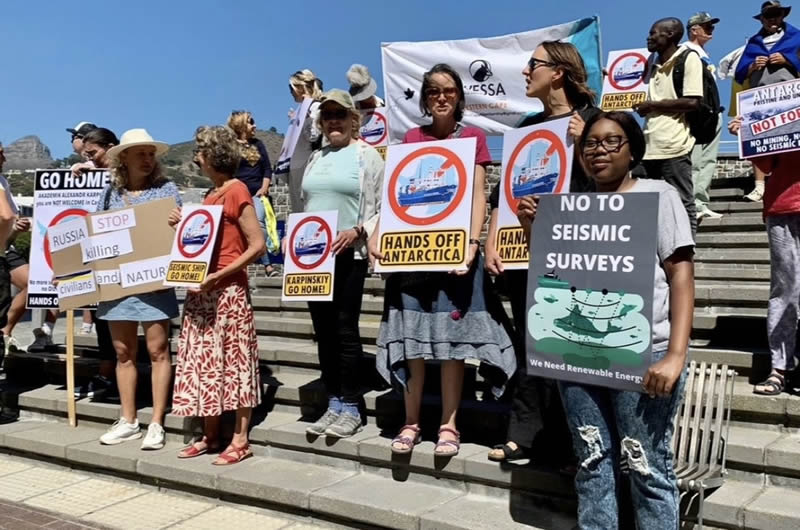
Jul 29, 2024 | Advocacy, Position papers
Pictured above: the Turkish floating power plant Osman Khan in the Ghanaian port of Sekondi Takoradi. (Image: Karpowership, from Daily Maverick site)
WESSA staff and volunteer activists opposed the proposal to mooring floating gas-powered powerstations in Saldanha, Ngqura and Richards Bay harbours, for contracts lasting 20 years.
Our opposition, along with many other NGOs and CBOs was based on the global warming and local environmental impacts, as well as on sustainable development and financial arguments against investing South Africa in a declining gas-energy future.
In July 2024, the SA government announced the withdrawal of these proposals. WESSA is now engaging in other offshore oil/gas seismic surveys and inland gas fracking proposal applications. Donate towards our advocacy work for a just energy transition.

Jul 29, 2024 | Advocacy
WESSA activists have for many years been trying to prevent the pollution of the Hartbeespoort Dam and the rivers that feed it.
Sewage from 4 dysfunctional municipal treatment works spilling down the Crocodile, Swartspruit and Magalies Rivers have caused significant eutrophication of the dam waters, leading to extensive hyacinth growth (and at times other invasive aquatic weeds), which often covers the dam in excess of 30% of the dam surface area. This in turn has significant detrimental impacts on the dam’s ecology.
WESSA staff and volunteers, along with those of The Magaliesberg Biosphere, National Association of Conservancies/Stewardship of SA, Birdlife Harties and civic structures, have been pressing for appropriate and lasting action. They have recently taken to conducting independent water quality testing to demonstrate the pollution load, that requires intervention from provincial and national government.
To support our efforts in stemming the sewerage pollution and/or get involved in the clean-ups and invasive plant control actions, please contact John Wesson by emailing jwesson@wessanorth.co.za.

Jun 14, 2024 | Advocacy
WESSA’s origins nearly one hundred years ago were grounded in advocating for dedicated conservation areas such as the Kruger National Park and other parks that now play a critical role in conserving and protecting our natural heritage and rich biodiversity. From the beginning we have tried to use our vision, expertise, experience, and passion to leverage citizens and decision-makers into finding lasting collaborative solutions as to how humans live on the planet. Thus, our motto: people caring for the Earth.
A century later, we find ourselves in a world threatened by climate change, biodiversity loss and pollution in which humans have removed themselves from nature and sought to exploit our natural resources to support consumer lifestyles. The Earth has limits, and we have crossed several of those boundaries already that now have dire impacts on our ecosystem and the Earth our children will inherit.
Educate, Advocate and Act
In the face of these challenges, and in recognition of South Africa’s rich terrestrial and marine resources, WESSA’s strategic focus has centred on three core activities: educate, advocate, and act. In turn we have committed ourselves to and are guided by the principles of sustainable (ecosystem) development; natural justice and a just transition; and collective sustainability. Specifically on the advocacy front we have sought to be both proactive and reactive, and work at both a local and national basis.
All-of-society approach
To this end, our local membership regions and branches have become actively involved in local issues which has ranged from participating in campaigns against oil and gas extraction in the ocean (like the Shell and CGG anti-seismic campaigns), taking up sewage and pollution issues in local rivers and catchments, and inputting into various environmental impact assessments amongst others. We try use our local knowledge, access to membership’s (scientific) expertise, and a collaborative all-of-society approach to leverage positive change.
Strong public stance on issues
At a national level, we have focused on raising our “voice” on environmental matters and taken a stronger public stance on issues. Consequently, we have given detailed input into government policy on aspects such as plastic waste, nuclear energy, and the biodiversity “economy;” and collaborating with other environmental NGO’s and the DFFE on initiatives such as the 30 x 30 commitment (30% of our marine and terrestrial habitats restored and protected by 2030). We are also working to establish a raft of policy positions on various aspects such as mining, energy, sustainable use, water catchments, pollution and the like to create a principled and strategic platform from which to engage on daily issues.
Within the operational side of WESSA, this has also resulted in dedicated resources to support advocacy work, the re-aligning of our blue flag beach oversight to be more advocacy orientated, and the creation of a species project focus on Pangolins. As such, advocacy is joint endeavour of central staff, membership, and the Board’s Environmental Governance Committee (EGC), which gives us an especially useful range of resources and interest.
While our planet and country’s ecosystems are in a critical state, we are blessed with a rich biodiversity in South Africa’s land and seas, and our advocacy work will continue to seek collaborative and sustainable solutions to protecting, building resilience, and being part of the nature upon which we are dependent.

Mar 27, 2024 | Advocacy, Position papers
As a whole we welcome the DFFE’s publishing of the NEMBA Draft National Biodiversity Economy Strategy. We believe it a significant and pragmatic step forward in addressing many of the challenges our natural heritage faces and ensuring the constitutional imperative that our children inherit a healthy ecosystem. As with any policy statement in a diverse country such as ours, it cannot please everyone, but we would encourage persons to consider the detail of what it proposes and whether it has the potential for significantly improving upon the current unsustainable status quo
Terrestrial and marine biodiversity best in the world
South Africa is blessed with terrestrial and marine biodiversity that is of the best in the world. Since humanity’s standing upright hundreds of thousands of years ago we have been dependent on natural resources and “ecosystem services” for our wellbeing. But that ecosystem is now threatened by human activity arising from the lifestyles and economies we have created off the backs of those resources. The science is clear, climate change and biodiversity loss represent an existential threat to human wellbeing. We have to urgently respond to the change by in turn transforming our behaviour and systems to both secure and restore those natural assets and their services that are integral to our survival.
But we are also challenged by the legacy impacts of colonialism and apartheid, and a global capitalist system that privileges the haves and supresses the have-nots through a consumerist orientation. Those systems have resulted in a prevalent conservation model in South Africa that fences off large tracts of lands and criminalises traditional hunting and gathering activities that were integral to many communities livelihoods and cultural practices.
Pragmatic reality
The pragmatic reality too is that South Africa already has a thriving biodiversity “economy”, but much of that happens in the shadows, supporting international criminal networks that have become expert at extracting and transporting high-value natural resources outside of South Africa. Rhino horn, abalone, pangolins, and succulents are amongst the more well-known examples that threaten those species and their habitats. Alongside those criminal activities we have commercial and “legal” exploitative practices of our wild spaces and species that have given rise to canned lion hunting, the lion bone trade, bush meat trade and the breeding of “fashionable” variants such as black impala and golden wildebeest.
None of those serve the integrity of our ecosystems. And of great concern is the unsustainable exploitation of fish stocks and the “gold rush” approach to offshore oil and gas reserves that fundamentally threaten our rich marine biodiversity. As things stand, we are likely to see the African penguin go functionally extinct in our lifetimes due to in the main over-fishing of their food stocks. African penguins are sentinel species, they are indicators of ecosystem health, and the need to conserve them is not because they are cute, but because we have to restore the ecosystems they depend on to do so, and in so doing help ourselves.
Something must be done. Urgently. The status quo is untenable.
Strides forward in public and private spheres
But while destructive practices abound, South Africa has made great strides in both the public and private spheres to secure and restore our biodiversity. There is no doubt that game ranching, private reserves, and conservancies have made a significant contribution to conserving wild spaces and species. There is no doubt that ecotourism generates significant benefits to the overall economy, and that its full potential has not been realised. And for those of us opposed to killing animals, the uncomfortable truth we must face is that trophy hunting and biltong/recreational hunts have made a positive difference to species wellbeing overall in the past. What the hunting fraternity in turn need to face is that consumptive preferences are changing, and South Africa’s wildlife “brand” is threatened by changing perceptions of what is socially acceptable. There may be money in trophy hunting now, but that’s changing rapidly, and we need to be looking at alternatives that have the same effect.
Support of sustainable development, natural justice, and collective stewardship
Guided by our principled support of sustainable development, natural justice, and collective stewardship, WESSA will be submitting extensive comments on the draft strategy. For instance we do not support trade in rhino horn because it leads to the domestication of such species and we lack the necessary governance and policing infrastructure to ensure such trade remains legitimate. We support wholeheartedly the dropping of fences and the creation of wild space corridors, but accept that in specific cases fences are required to keep human-animal conflict to a minimum. We would point to the Babanango Game Reserve and the Tsitsikamma National Park amongst many others as to how conservation and local community beneficiation can work.
We would however caution the drafters of the strategy that seek with good intent to make conservation “pay its way” and reduce the value of our biodiversity to a balance sheet entry. While it may be tempting to show biodiversity’s Rand value, it is in part that thinking that drives the notion that nature is there to solely serve our interests. The strategy may of necessity be focused on the “economy” of biodiversity, but it must form part of a raft of strategies that addresses the non-economic value and approach to our wild spaces and species.
Our ecosystem is a complexity. We are part of nature not separate from it. And it requires all of us, or at least a sufficient majority, to make sure we not only conserve what we have but rethink our relationship with the planet and the diversity of species we share it with. The strategy needs refining, but it is in our view a useful and necessary step forward.
Dr Gary Koekemoer (Chairperson WESSA EGC – Environmental Governance Committee)
Cindy-Lee Cloete (Acting CEO WESSA)
In response to The Sunday Times




